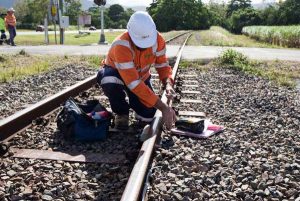Oliver Probert – Sydney
oliver.probert@primecreative.com.au @oliverprobert More by Oliver Probert
July 9, 2019
Rail Control Systems Australia was founded in 2007 by a pair of Signalling Engineers who identified a clear niche in the market. Today it has grown to work on projects as large as Brisbane’s Cross River Rail. Rail Express speaks with Paul Hann and Richard Ogilvie about their business.
Twelve years ago, Paul Hann and Richard Ogilvie recognised a need within the rail sector for better signalling project delivery. Assured there was the necessary talent to fill that niche, the pair co-founded Rail Control Systems Australia (RCS Australia).
“Richard and I were both Signalling Engineers and had met each other previously on various projects around the world, but at the time we were both working in Australia,” Hann, who recently took on the role of CEO, tells Rail Express.
“We recognised there was a good talent pool of Signalling Engineers, and we thought if we put some of them together we could deliver some better-quality engineering than we were seeing at that time around the industry.”
The pair brought together a core team of signalling, design and testing and commissioning expertise at first based in both Brisbane and Melbourne, with the aim of combining signalling expertise with solid project management capabilities.
“Predominantly we were aiming to provide that combination of engineering talent and project delivery: really understanding the client’s needs, and getting it right the first time, so the client really got what they were after – which was not necessarily what was being given to them.”
Ogilvie, both a Mechanical Engineer and a qualified Signalling Engineer, says RCS Australia sought to serve customers not only through its end-to-end capabilities, but through its independent position.
“Most of the signalling delivery resources within Australia were based either in a railway itself – say a state-owned operator – or with one of the OEMs,” he says.
Hann and Ogilvie perceived inherent flaws to this status quo: signalling expertise constrained within just one operator would be limited to the experience and capabilities of that operator, and by a smaller dedicated team. Meanwhile, expertise within one of the major OEMs would be limited to providing only that OEM’s solution.
“We started by focusing on that top-level signalling design and commissioning, but that grew into focusing more on holistic project delivery,” Hann explains. “We’ve added a construction capability to the business, because it became apparent we could do well putting together a design and construct sort of offering. And where we’ve driven that is to try and get as much of an end-to-end offering to our clients where we can.”
Now with offices in Australia, Hong Kong and the United Kingdom, RCS Australia is capable of providing a technology solution and engineering a job: designing, building, commissioning and even maintaining it. The company works across mainline, freight, metro and light rail, with the goal of providing clients with holistic signalling project delivery.
GROWTH FOCUS
Key to RCS Australia’s growth since it was founded in 2007 has been its versatility.
“Growth has come from a number of different areas,” Hann says. “In some cases we’ve been a part of a multi-disciplined alliance delivery model, and that’s given us the opportunity to develop our discipline expertise in the signalling space, while working on those larger projects.
“We’ve also grown as a technology solutions provider, and Whyalla was a formative project in that space. It was our first install of a commercial off-the-shelf, SIL4 signalling solution, and that project proved to us there were definitely some opportunities for pursuing that kind of technology in Australia.”
The Whyalla project Hann refers to, which RCS Australia delivered for Leighton Contractors in 2012, involved the design and construct of a complete signalling solution for Arrium Mining’s Whyalla Port Expansion Project, located within the OneSteel steel works in Whyalla, on the upper north east coast of South Australia’s Eyre Peninsula.
The project incorporated 15 kilometres of steel track, two signalled balloon loops, 11 active level crossings, and interfaces with two existing main and several internal rail lines. RCS Australia was responsible for the scope, design, procurement, construction, installation, testing and commissioning of the system, as well as delivery of power and communication networks.
The remoteness of Whyalla meant the RCS Australia team had to conduct special planning and budgeting. Further complexities included variable cable and equipment delivery rates, and having to consolidate freight from different sources. Despite these challenges, the project was a major success, and Ogilvie now considers it a milestone for the business.
“It was at that time, around six or seven years ago, that we thought rather than being a consultancy working to an hourly rate, we were prepared to stand on our own two feet and take on large quantities of work on a fixed price basis,” he says.
“We give the customer certainty on a project and are prepared to back ourselves in terms of how it’s delivered. I think that’s one of the key service differentiators that we provide: in some respects, we are like a consultancy, but we are always happy to put down a firm price and manage that for the customer.”
Ogilvie also notes that during RCS Australia’s growth, the market has changed in terms of how technology is provided, and the company has responded to that shift.
“Technology and signalling systems used to be generally available to system integrators and companies like ourselves, and that’s less-so these days,” he explains. “We’ve recognised that gap in the market and that started us down the track of delivering our own signalling products and SIL4 systems. They’re based on commercial off-the-shelf technology; not proprietary, not vendor-locked, and they give both us and our customers the ability to take full control of the finished product, and maintain it throughout its life-cycle.”
“The old model of proprietary, vendorlocked systems; there’s a bit of a desire to break away from that,” Hann adds. “There’s a desire from the customer to have a little bit more control over the engineering of the product, or what they can do with it.
“Ten years ago a commercial off-theshelf offering was probably being dismissed by the industry as not viable, but it’s now very relevant, and we’re seeing a lot of movement in that space. I think there’s going to be a lot more commercial off-the-shelf solutions within the industry.”
Hann says despite the company’s growth and versatility, RCS Australia has managed to maintain a high level of signalling expertise and industry knowledge.
“Many of the people who were part of our founding team are still with the business,” he says, “and now that’s combined with the commercial offerings we have within the technology space, and our ability to really get the best outcomes for our clients on a project-specific basis.”
The flexibility that helped the company grow is still a major asset. While still working on technology supply and smaller project delivery, RCS Australia’s successful project portfolio also includes major operations like the Cranbourne Pakenham Rail Corridor Project, where it worked to provide updated reference designs to Metro Trains Melbourne, and the Cross River Rail Project in Brisbane, where it is part of the Unity Alliance delivering the design, supply and installation of the supporting rail system, and integration of Cross River Rail into the broader South East Queensland network.
“We might be designing, constructing and providing the technology for one project, design only on another, construct only on the next,” Hann says. “We maintain a very strong ethic of looking at our client’s needs, and ensuring they get success out of their project, and that’s what drives us.”
INTERNATIONAL PUSH
Ogilvie also says the RCS Australia team has benefitted from a vast amount of international experience. “In the engineering sector, but particularly in signalling, there is a fairly strong push for people to work in different parts of the world,” he says.
“In our formative years, we were bringing together a group of people who had done work in a number of different regions, and that experience has seen us provide solutions to projects in places like the UK, Taiwan and Indonesia.
“One of our key capabilities is providing technology solutions that aren’t OEMdriven, but commercial off-the-shelf. And that’s picking up in some markets overseas: we have a trial site in Taiwan at the moment, and there are opportunities to export that technology to places like New Zealand, Europe, Asia and the United States.”
This article was originally published by Rail Express and reproduced with permission

